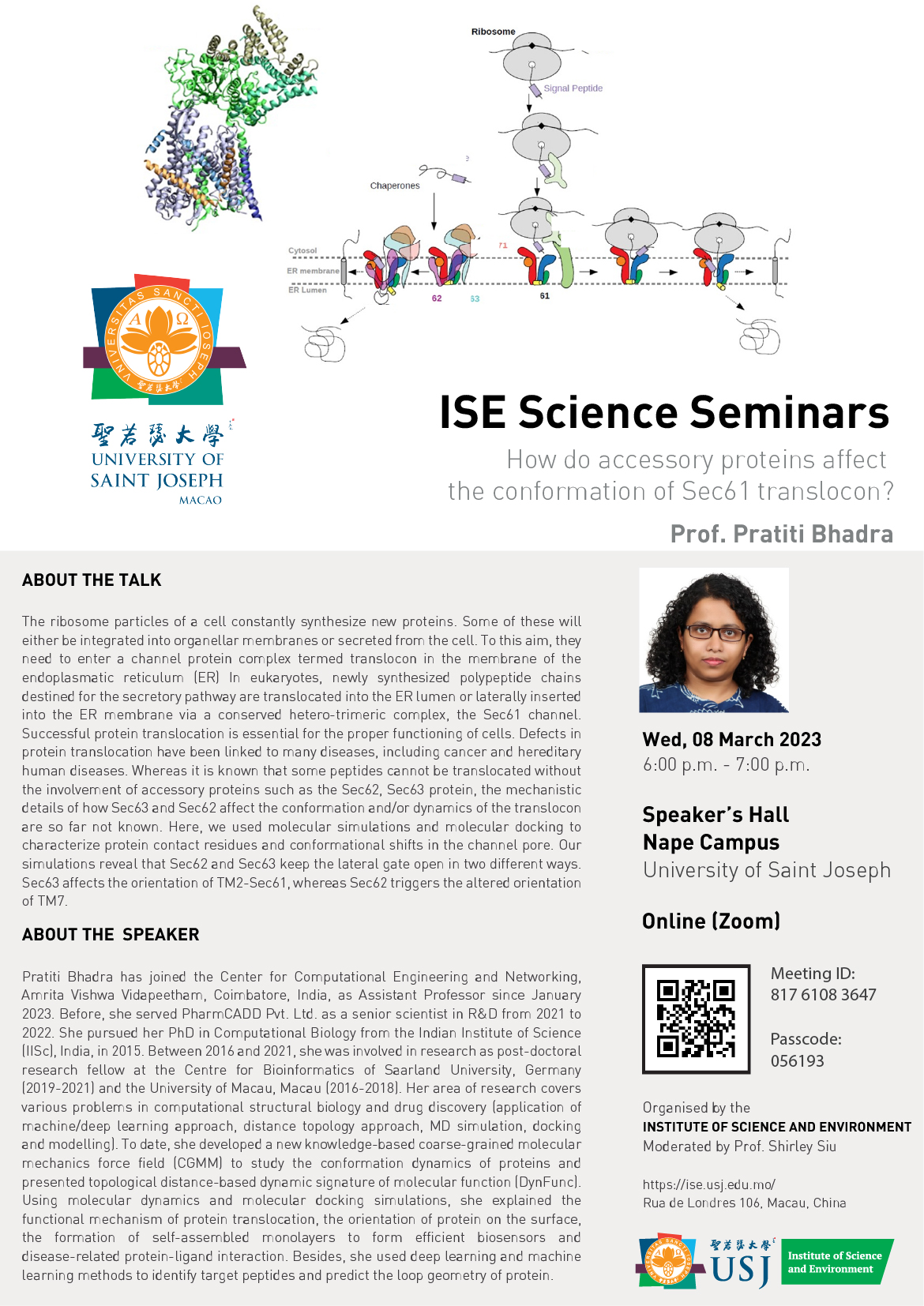ISE Science Seminar | How do accessory proteins affect the conformation of Sec61 translocon?

ISE Science Seminar | How do accessory proteins affect the conformation of Sec61 translocon?
08
Mar
The Institute of Science and Environment’s Science Seminar “How do accessory proteins affect the conformation of Sec61 translocon?” will be held on March 8.
ABOUT THE TALK:
The ribosome particles of a cell constantly synthesize new proteins. Some of these will either be integrated into organellar membranes or secreted from the cell. To this aim, they need to enter a channel protein complex termed translocon in the membrane of the endoplasmatic reticulum (ER) In eukaryotes, newly synthesized polypeptide chains destined for the secretory pathway are translocated into the ER lumen or laterally inserted into the ER membrane via a conserved hetero-trimeric complex, the Sec61 channel. Successful protein translocation is essential for the proper functioning of cells. Defects in protein translocation have been linked to many diseases, including cancer and hereditary human diseases. Whereas it is known that some peptides cannot be translocated without the involvement of accessory proteins such as the Sec62, Sec63 protein, the mechanistic details of how Sec63 and Sec62 affect the conformation and/or dynamics of the translocon are so far not known. Here, we used molecular simulations and molecular docking to characterize protein contact residues and conformational shifts in the channel pore. Our simulations reveal that Sec62 and Sec63 keep the lateral gate open in two different ways. Sec63 affects the orientation of TM2-Sec61, whereas Sec62 triggers the altered orientation of TM7.
ABOUT THE SPEAKER:
Pratiti Bhadra
Assistant Professor, Amrita Vishwa Vidyapeetham, India
Pratiti Bhadra has joined the Center for Computational Engineering and Networking, Amrita Vishwa Vidapeetham, Coimbatore, India, as Assistant Professor since January 2023. Before, she served PharmCADD Pvt. Ltd. as a senior scientist in R&D from 2021 to 2022. She pursued her PhD in Computational Biology from the Indian Institute of Science (IISc), India, in 2015. Between 2016 and 2021, she was involved in research as post-doctoral research fellow at the Centre for Bioinformatics of Saarland University, Germany (2019-2021) and the University of Macau, Macau (2016-2018). Her area of research covers various problems in computational structural biology and drug discovery (application of machine/deep learning approach, distance topology approach, MD simulation, docking and modelling). To date, she developed a new knowledge-based coarse-grained molecular mechanics force field (CGMM) to study the conformation dynamics of proteins and presented topological distance-based dynamic signature of molecular function (DynFunc). Using molecular dynamics and molecular docking simulations, she explained the functional mechanism of protein translocation, the orientation of protein on the surface, the formation of self-assembled monolayers to form efficient biosensors and disease-related protein-ligand interaction. Besides, she used deep learning and machine learning methods to identify target peptides and predict the loop geometry of protein. She is the author/co-author of more than 15 peer-reviewed journal. Her research works were published in reputed journals, namely Comp. Biol. Med.; J.Proteome Res.; Prot. Struc. Func. and Bio.; Sci. Rep.; J. Phy. Chem. C; Langmuir; Mol. Ther. Nuc. Aci.; Front. imm; Plos. Comp. Bio.; Biochem. J; IJMS, BBA-Biomembranes and Molecules.
Details:
Date: Wednesday, 8 March 2023
Time: 6:00 p.m. – 7:00 p.m (Macau)
Mode: Face-to-Face or Online (Zoom)
Location: Speakers Hall, Nape Campus
Organised by: Institute of Science and Environment (ISE)
Moderated by: Shirley Siu (ISE)
Join Zoom Meeting
https://us06web.zoom.us/j/81761083647?pwd=cHdpbTRzSk5TYW5LVXRWcVE3Uk5xdz09
Meeting ID: 817 6108 3647
Passcode: 056193
*Free event, open to the general public
*Sessions will be conducted in English


 Add to my Google Calendar
Add to my Google Calendar







